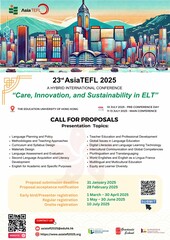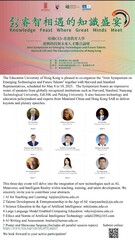Classroom-based Qualitative Research (CBQR): Methodological Prospects and Possibilities
- 10 Jan, 2020 | 12:45 - 14:15
- B3-LP-04
- Seminar
- English
- Dr Peter De Costa
- Department of English Language Education
Speaker: Dr Peter DE COSTA (Michigan State University, USA)
The classroom continues to be a crucial site of research for second language acquisition (SLA). In particular, close in-depth analyses of classroom interaction and its impact on language development has been the focus of qualitative SLA researchers who often adopt conversation analysis, case study and ethnography as their preferred methodological approach. Building on these developments and the growing interest in examining the social and contextual factors that affect language learning in both the physical and virtual language classroom, I engage in a critical discussion of classroom-based qualitative research by (1) providing an overview of the main qualitative methodologies and frameworks used in L2 classroom research, and (2) examining contemporary constructs and issues related to qualitative research carried out in classroom settings. I will first present several common qualitative methodologies such as case studies classroom ethnography, and conversation analysis that have been applied to L2 classroom research. In addition to some of these most widely used methodologies, we describe some other common and significant qualitative methods (e.g., interviews, focus groups, observations) that are employed in conjunction with these methodologies. Next, we explore SLA theories (e.g., sociocultural theory, language socialization), discourse analytic approaches (e.g., Conversation Analysis, Critical Discourse Analysis), and discourse analytic tools (e.g., CAQDAS, NVivo) that are generally adopted by classroom-based researchers. These methodologies and methods will be discussed in relation to contemporary phenomena such as translanguaging, world Englishes, and neoliberalism that characterize L2 classrooms today. I will also discuss some key issues surrounding qualitative research. These issues include the notion of research quality (Mahboob et al., 2016) and researcher reflexivity in terms of researcher assumptions and biases in relation to classroom based research. In our discussion of qualitative classroom research, and the core issues surrounding it, we also focus on contemporary SLA constructs such as emotions, language ideologies, and identity in order to create a holistic understanding of the dynamics surrounding language acquisition










